

Edutopia. It is often said that a sign of insanity is doing something over and over again and expecting different results each time. This sums up how most American schools are dealing with the homework issue. Not only does homework impact students but it also impacts their families. It is common for students and families to feel that they don’t have the time it takes to maintain a healthy balance between work and the rest of their lives. Family time that could be spent getting outdoors, visiting friends and relatives, and relaxing is being unnecessarily burdened by the large amount of homework kids have to do.
One student’s homework has the power to reshape how the entire family spends its time and sets its schedules. Alternatives To Homework: A Chart For Teachers. Alternatives To Homework: A Chart For Teachers by TeachThought Staff Part of rethinking learning means rethinking the bits and pieces of the learning process–teaching strategies, writing pieces, etc.
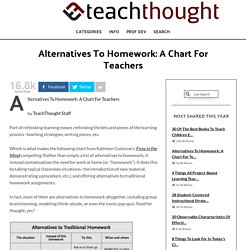
Which is what makes the following chart from Kathleen Cushman’s Fires in the Mind compelling. Rather than simply a list of alternatives to homework, it instead contextualizes the need for work at home (or, “homework”). It does this by taking typical classroom situations–the introduction of new material, demonstrating a procedure, etc.), and offering alternatives to traditional homework assignments. In fact, most of them are alternatives to homework altogether, including group brainstorming, modeling/think-alouds, or even the iconic pop-quiz. Infographic: Time spent on homework. Replacing homework with sporting activities. The research around the impact of homework on learning outcomes is not conclusive, and at times contradictory.

If your school is considering stopping formal homework and encouraging students to do something else, what are the alternatives? Here’s one school’s approach. Edutopia. The real question we should be asking is, "What do we believe should happen after the end of the school day to help ensure that students retain what they have learned and are primed to learn more?
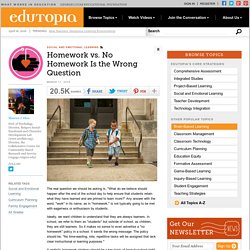
" Any answer with the word, "work" in its name, as in "homework," is not typically going to be met with eagerness or enthusiasm by students. Ideally, we want children to understand that they are always learners. In school, we refer to them as "students" but outside of school, as children, they are still learners. So it makes no sense to even advertise a "no homework" policy in a school. It sends the wrong message. A realistic homework strategy should be a key topic of back-to-school night and the first parent-teacher conferences of the school year.
Home Activities That Matter the Most Some parents will select focused programs or after-school experiences to help foster their children's learning in one or more of the aforementioned areas. Parents Playing Their Part Reference Elias, M. What To Do When Students Turn In Incomplete Work. By Heather M.
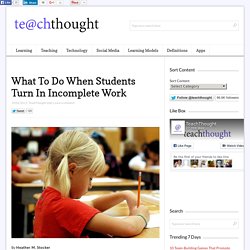
Stocker It’s like looking at a photograph where only a small bit of the picture is discernible, but you can’t tell that what you’re actually looking at. This is what happens when students turn in incomplete assignments. Incomplete assignments only give a partial snapshot of student ability. A parent's view of homework: I waver between tolerance and outright hatred.
Like many parents, I have a complicated relationship with homework.

One day I’m reminding my children to get to work – vocabulary doesn’t happen by osmosis – and the next I’m struggling to understand the work myself, let alone find the time to help. I’ve had nearly two decades of helping my children (now aged 22, 19 and 12) with everything from simple addition to Spanish verb endings. Homework has covered the gamut of straightforward memorization or comprehension, to detailed research of family matters, complete with photographs and tales supplied by me. There are some things I accept about homework: teachers can’t spend the entire lesson making sure all children keep up and most students need time for new topics to sink in.
Unfortunately, however, there are a few items on my dislike list too. Parental involvement. Debunking Homework Myths. "Do you have any homework tonight?
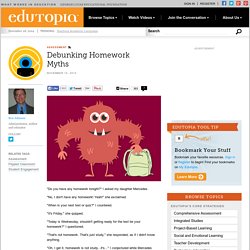
" I asked my daughter Mercedes. "No, I don't have any homework! Yeah! " she exclaimed. Does homework contribute to student success? Homework – an eight letter word likely to spark an immediate and impassioned response.
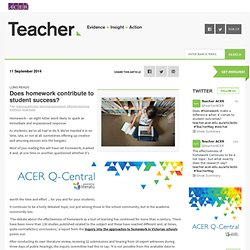
As students, we've all had to do it. We've handed it in on time, late, or not at all (sometimes offering up creative and amusing excuses into the bargain). Most of you reading this will have set homework, marked it and, at one time or another, questioned whether it's worth the time and effort ... for you and for your students. It continues to be a hotly debated topic, not just among those in the school community, but in the academic community too. 'The debate about the effectiveness of homework as a tool of learning has continued for more than a century. After conducting its own literature review, receiving 32 submissions and hearing from 16 expert witnesses during three days of public hearings, the inquiry committee had this to say: 'It is not possible from the available data to make unequivocal statements about the effectiveness of homework overall in assisting student learning.’
Timely feedback. Private schools: more homework but no academic advantage says OECD. Australian private school students spend two hours a week more on homework than their public school counterparts but do not perform better academically when socio-economic advantage is taken into account, according to a major report into educational performance around the world.
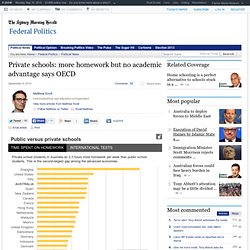
The Organisation for Economic Co-operation and Development's Education at a Glance 2014 report also finds Australian students spend more time in the classroom than anywhere else in the developed world even though they are increasingly being outperformed by students in other countries. The report finds Australian private school students spend 7.4 hours a week on homework, an extra-curricular workload that is among the highest in the developed world.
Australian public school students spend 5.1 hours on homework a week, just above the OECD average of 4.9 hours a week. Students in Shanghai, China, top the world by spending 13.8 hours on homework a week. Advertisement.